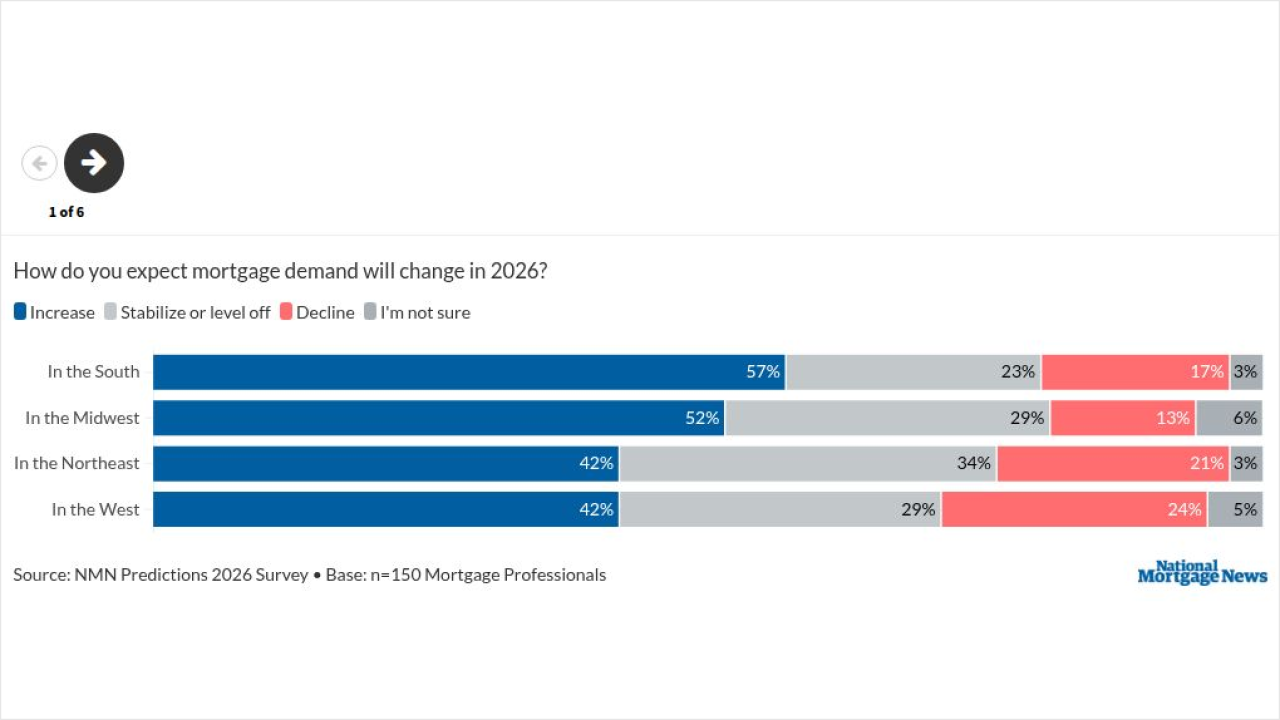Mortgage borrowing moved sideways again last week, struggling to gain momentum, with rates volatile after
The Mortgage Bankers Association's Market Composite Index, a measure of loan application volume based on surveys of the trade group's members, still managed to eke out a seasonally adjusted 0.1% uptick
The conforming 30-year mortgage rate among lender members headed to its highest in over a month, contributing to subdued borrowing, according to Joel Kan, MBA vice president and deputy chief economist. Persistent inflation has helped keep rates elevated, and Wednesday's release of March's Consumer Price Index is unlikely to provide any downward pressure in the immediate future.
CPI rose 3.5% year over year and 0.4% on a monthly basis, surpassing economists' consensus expectations. The higher than expected inflation further lowers the chances the Federal Reserve will decide to cut its funds rate at its next meeting.
"Inflation remains stubbornly above the Fed's target, and the broader economy continues to show resiliency. Unexpectedly strong employment data released last week further added to the upward pressure on rates," Kan said in a press release.
The 30-year rate for mortgages with balances below $766,550 in most markets jumped 10 basis points to 7.01% from 6.91% a week earlier.
The latest rate levels helped bring the Purchase Index down by a seasonally adjusted 4.7% from the prior survey. Purchases also clocked in 22.8% below activity from a year ago and are now running at their slowest pace since late February, Kan said.
The mean purchase-loan size, though, declined from an almost two-year high a week earlier, falling back 0.8% to $449,400 from $453,000.
While rates are dampening activity, recent data also shows the potential of consumer demand rising with both
Meanwhile, the Refinance Index helped carry the overall market to its gain with a 9.9% weekly surge, driven by a significant uptick in loans coming through the Department of Veterans Affairs. The portion of refinances relative to total volume also increased to 33.3%, up from 30.3%.
Federally backed activity also grew almost entirely thanks to refinance volume, with the seasonally adjusted Government Index rising 9.8% week over week. The share of applications guaranteed through federal programs, likewise, increased.
Mortgages backed by the Federal Housing Administration nabbed a 12.1% share compared to 11.7% seven days earlier, while VA-sponsored loans made up 14%, surging from 12.1%. Applications coming through the U.S. Department of Agriculture inched downward, however, to 0.4% from 0.5%.
Interest rates tracked by the MBA increased across the board alongside the conforming average last week. The 30-year jumbo rate climbed up to 7.13% from 7.06%. Points decreased to 0.56 from 0.57.
The FHA-backed 30-year fixed contract rate increased to 6.8% from 6.74% week over week, while points rose to 0.93 from 0.9 for 80% LTV-ratio loans.
The 15-year fixed mortgage rate averaged 6.46%, jumping 11 basis points from 6.35%. Borrowers typically used 0.6 points to bring down the rate compared to 0.56 seven days earlier.
The 5/1 adjustable-rate mortgage, which starts with a 60-month fixed term, climbed to 6.41% from 6.37%, while points decreased to 0.67 from 0.68.
While a rise in fixed rates frequently brings about increased ARM activity, volumes fell 0.8% from the prior week, according to the MBA. The ARM share relative to overall activity also slipped to 6.9% from 7% seven days earlier.




